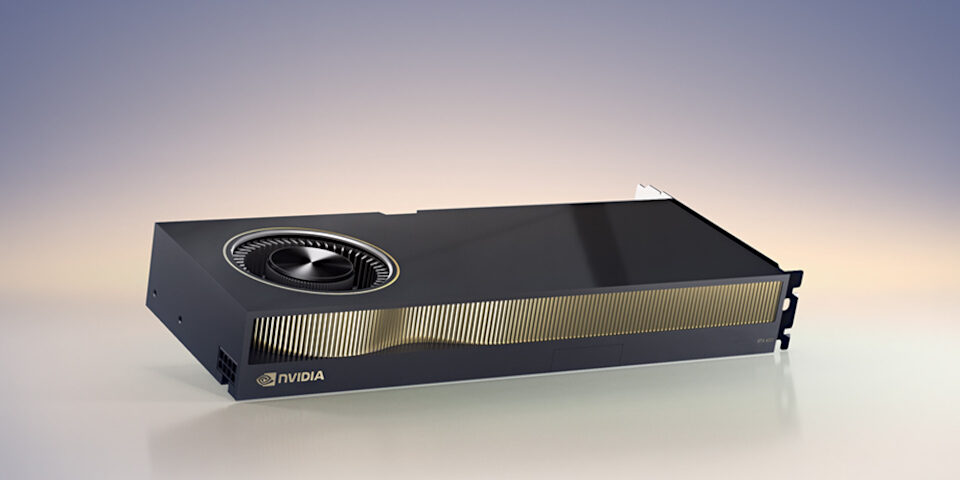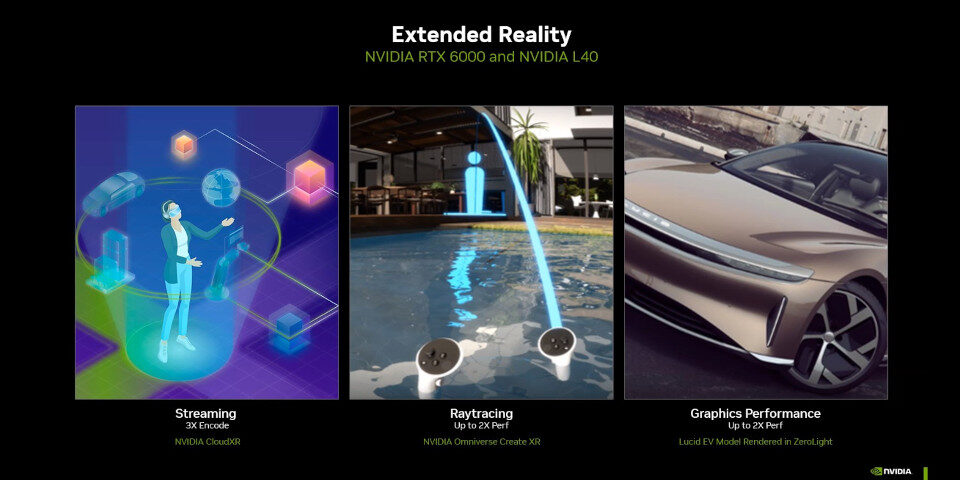Nvidia unveils next-generation RTX 6000 workstation GPU

Originally posted on 20 September 2022, and updated with details of the RTX 6000’s final specs.
Nvidia has unveiled the RTX 6000, the first workstation GPU based on its new Ada Lovelace architecture.
The 48GB card, which provides “2-4x the performance” of the previous-generation RTX A6000, is due to ship in December, and is targeted at markets including CG content creation, GPU rendering and simulation.
The RTX 6000 was announced during Nvidia’s GTC 2022 conference, alongside the GeForce RTX 4090 and 4080, its gaming counterparts, new server and data centre GPUs, and updates to Omniverse Cloud.
The first workstation GPU based on Nvidia’s Ada Lovelace GPU architecture
The RTX 6000 is the first workstation card based on Nvidia’s new Ada Lovelace GPU architecture, intended to provide “revolutionary performance for ray tracing and AI-based neural graphics”.
Performance notwithstanding, many of the underlying changes are evolutionary rather than revolutionary, via updates to the RT ray tracing cores and Tensor AI inferencing cores present in current-gen Ampere GPUs.
The third-generation RT cores in Ada Lovelace GPUs provide “2x the throughput” of their current-gen equivalents, and feature enhancements intended to speed up rendering of ray traced motion blur.
The fourth-generation Tensor cores also deliver “more than 2x throughput” than their current-gen counterparts for tensor matrix operations, and support “more data types” and “new FP8 precision modes”.
The Ada Lovelace cards also feature a new generation of CUDA cores for general-purpose GPU computing, again promising an increase of “up to 2x” in FP32 compute performance.
Other new features of the architecture targeted at professional graphics work include native AV1 encoding, previously only supported in Intel’s new Arc A-Series GPUs.
| High-end Nvidia workstation GPUs | |||||
|---|---|---|---|---|---|
| RTX 6000 | RTX A6000 | RTX A5500 | RTX A5000 | ||
| Architecture | Ada Lovelace | Ampere | Ampere | Ampere | |
| CUDA cores | 18,176 | 10,752 | 10,240 | 8,192 | |
| Tensor cores | 568 | 336 | 320 | 256 | |
| RT cores | 142 | 84 | 80 | 64 | |
| Compute performance FP32 (Tflops) |
91.1 Tflops | 38.7 Tflops | 34.1 Tflops | 27.8 Tflops | |
| GPU memory | 48GB GDDR6 |
48GB GDDR6 |
24GB GDDR6 |
24GB GDDR6 |
|
| Memory bandwidth | 960 GB/s | 768 GB/s | 768 GB/s | 768 GB/s | |
| NVLInk | No | Yes | Yes | Yes | |
| Graphics bus | PCIe 4.0 x16 | PCIe 4.0 x16 | PCIe 4.0 x16 | PCIe 4.0 x16 | |
| TDP | 300W | 300W | 230W | 230W | |
| Display connectors | 4 x DP 1.4 | 4 x DP 1.4 | 4 x DP 1.4 | 4 x DP 1.4 | |
| Size (H x L) | 4.4” x 10.5” Dual slot |
4.4 x 10.5″ Dual slot |
4.4 x 10.5″ Dual slot |
4.4 x 10.5″ Dual slot |
|
| Launch date | 2022 | 2020 | 2022 | 2021 | |
| Launch price | $6,799 | $4,649 | $3,600* | $2,250* | |
*Estimated street price at time of launch.
Key specifications
On paper, the RTX 6000 is a significant step up from its predecessor, the RTX A6000, the top-of-the-range Ampere GPU.
Its CUDA core count is almost twice that of the RTX A6000, as are its RT and Tensor core counts.
However, graphics memory is unchanged from the RTX A6000 – 48GB of GDDR6 memory – so there will be no increase in the maximum size of 3D scenes that fit into GPU memory during GPU rendering.
Other key specifications like size, power consumption and display connectivity are also unchanged.

Benchmarks and real-world performance
Nvidia’s press release for the RTX 6000 puts its overall performance at “2-4x” that of the RTX A6000.
That’s also in line with a quoted increase of “up to 2x” in ray tracing performance in Omniverse XR, Nvidia’s new application for viewing production-scale USD assets in virtual or augmented reality.
Outside the firm’s own software, Nvidia’s press briefing today featured positive – if less specific – quotes from renderer developers Chaos and Luxion.
Chaos noted “considerable speedups across our CUDA, RTX and DXR engines” in both V-Ray GPU, V-Ray’s GPU render engine, and real-time rendering tool Chaos Vantage.
Luxion predicted “incredible performance gains” for users of its KeyShot renderer.
Pricing and release dates
The RTX 6000 is due to ship in December 2023 with a MSRP of $6,799.
Read more about the RTX 6000 workstation GPU on Nvidia’s product website
See more detailed specifications for the RTX 6000 on Nvidia channel partner PNY’s website
